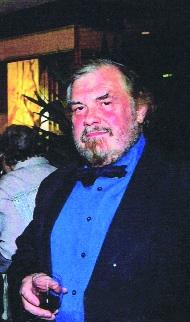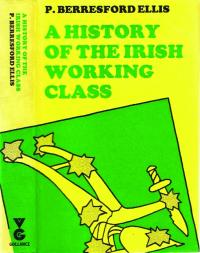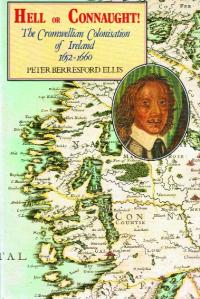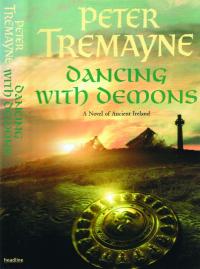‘Practising history without a licence’:Peter Berresford Ellis and popular history
Published in 20th-century / Contemporary History, Confederate War and Cromwell, Cromwell, Features, Issue 5 (Sept/Oct 2010), Volume 18
Prolific author, historian, pamphleteer and journalist Peter Berresford Ellis is a Fellow of the Royal Historical Society, a Fellow of the Royal Society of Antiquaries of Ireland, an Honorary Life Member of the Irish Literary Society, Honorary Life President of the Scottish 1820 Society, Honorary Doctor of Letters, University of East London, and a Bard of the Cornish Gorseth
Before A history of the Irish working class, Hell or Connaught! The Cromwellian colonisation of Ireland (1975) and The Boyne Water (1976), Peter Berresford Ellis had published books on the histories of Wales and Scotland. In more recent years his historical work has focused on the ancient Celtic peoples—ancestors of the Irish, Welsh, Cornish, Manx, Scots and Bretons—although he is careful to point out that he considers these as belonging to a linguistic, rather than some bogus ‘racial’, category. As the Coventry-born son of a Cork journalist who made most of his career in England, and of an English mother whose own mother was Breton, how could he not, he muses, have become interested in things Celtic? ‘Things Celtic’ go to the heart of Berresford Ellis’s political beliefs: his book The Celtic revolution (1985) is subtitled A study in anti-imperialism. Like his hero, James Connolly (whose Selected writings he edited and introduced for Penguin Books in 1973), he believes that to achieve true social justice and human freedom, national autonomy and socialism must march forward together in lock-step. ‘National and social freedoms are not two separate and unrelated issues. They are two sides of one great democratic principle, each being incomplete without the other.’ Thus, he contends, imperialism, be it of the Chinese in Tibet, the Russians in Chechnya or the English in Ireland, is always and everywhere an evil. Even as a member of the left wing of the British Labour Party he concedes that while an independent Scotland, by reducing the party’s electoral base, may well doom England to perhaps generations of Tory rule, the price would have to be paid—although he is not certain that ultimately the English, confronted by themselves, would pay that price.
Relationship between ‘popular’ and ‘academic’ history
Working as a journalist—including a stint as the first deputy editor of the Irish Post, launched in 1970—who also wrote books, Berresford Ellis finally gave up his day job in 1975 to become a full-time writer. He secured a first-class honours degree and his Master’s degree in Celtic Studies but did not bother to proceed to a doctorate. (‘I was too busy and also was not interested in entering academia.’) His career as a historian (he is also, of course, ‘Peter Tremayne’ the novelist) casts two perennial issues about the historian’s craft into particularly sharp relief: first, what is the role of ideological presuppositions in shaping historical interpretation, and second, what is the relationship between ‘popular’ and ‘academic’ history? Berresford Ellis is unusually (some might say refreshingly) frank about his position: since the notion of unbiased history is a fiction, it is more honest and more helpful if the historian ‘declares his interest and goes on from there’. To cite only one example, ‘unlike many so-called “objective” historians and commentators,’ he writes in the preface to The Celtic revolution, ‘I prefer to state my bias at the outset. I write as someone who fully supports Celtic cultural, political and economic independence. Nor do I disguise the fact that I am a socialist.’
 Such blunt assertions do not, however, dispose of the complex and venerable philosophical and methodological conundrums strewn along a spectrum stretching from bullish political engagement to high-minded intellectual detachment. For instance, is it any part of the historian’s business to condemn, say, Thomas Jefferson for owning slaves, or Trevelyan for failing to fund adequate famine relief? To do so is to wrench them from their historical contexts and arraign them according to present-day standards, and that is unhistorical. Berresford Ellis considers the Cromwellian conquest and settlement of Ireland morally reprehensible, and passes judgement freely and accordingly. But does that do justice to those English republicans who believed that they were exporting republican liberty, breaking chieftainships that oppressed the poor and sweeping away popery, which shackled the poor and ignorant in superstition and mental servitude? Conquest was not justifiable, in Berresford Ellis’s view, even by such early modern republican lights, and it is not unhistorical to say so because there were those at the time—the Leveller regiments who refused to serve in Ireland, the republican MP and regicide Henry Marten—who rejected conquest. Such minority voices were part of the context. And the same may be said of slavery and the Famine. Alternatives were imaginable; choices were taken; in retrospect value-judgements may be made. These positions are further elaborated in his 1989 C. Desmond Greaves Memorial Lecture, published as a Connolly Association pamphlet, Revisionism in Irish historical writing: the new anti-nationalist school of historians (1990).
Such blunt assertions do not, however, dispose of the complex and venerable philosophical and methodological conundrums strewn along a spectrum stretching from bullish political engagement to high-minded intellectual detachment. For instance, is it any part of the historian’s business to condemn, say, Thomas Jefferson for owning slaves, or Trevelyan for failing to fund adequate famine relief? To do so is to wrench them from their historical contexts and arraign them according to present-day standards, and that is unhistorical. Berresford Ellis considers the Cromwellian conquest and settlement of Ireland morally reprehensible, and passes judgement freely and accordingly. But does that do justice to those English republicans who believed that they were exporting republican liberty, breaking chieftainships that oppressed the poor and sweeping away popery, which shackled the poor and ignorant in superstition and mental servitude? Conquest was not justifiable, in Berresford Ellis’s view, even by such early modern republican lights, and it is not unhistorical to say so because there were those at the time—the Leveller regiments who refused to serve in Ireland, the republican MP and regicide Henry Marten—who rejected conquest. Such minority voices were part of the context. And the same may be said of slavery and the Famine. Alternatives were imaginable; choices were taken; in retrospect value-judgements may be made. These positions are further elaborated in his 1989 C. Desmond Greaves Memorial Lecture, published as a Connolly Association pamphlet, Revisionism in Irish historical writing: the new anti-nationalist school of historians (1990).
False dichotomy?
 The debate between popular and professional history is ancient and often premised on a false dichotomy. T.W. Moody, a most exacting, formal and precise scholar—the epitome of the professional ethos—passionately believed it part of his brief to reach the widest possible audience, and pioneered RTÉ radio’s Thomas Davis lectures. Thomas Pakenham’s riveting narrative account of the 1798 Rebellion, the best-selling The Year of Liberty (1969), is thoroughly researched and may still be read with profit today. Both Pakenham and Berresford Ellis, neither of whom are Ph.Ds or ever held a university post, ‘practice history without a licence’, to borrow a phrase from a recent American intervention in the debate. Indeed, Berresford Ellis often dispenses with the full scholarly panoply of footnotes and appendices, though not with in-text references, printed primary sources or bibliographies. He makes no claim to an academic status to which he does not feel entitled and to which he does not aspire. Rather he sees his role as an ‘interpreter, somewhere between the academics and the general public’, and his principal function as communication. While suspicious of the overly specialised, and recondite, footnote-quibbling-with-footnote mode of history, he is the first to recognise the value of careful scholarship, for example directing the readers of his Boyne Water to the work of the then foremost authority on Jacobite and Williamite Ireland, J.G. Simms. Ultimately what matters to him is to reach as many readers as possible. Once again his political enthusiasms enter the equation, and in a neat reversal of the revisionist credo he seeks to ‘cut through myths’ perpetuated by mainstream history.
The debate between popular and professional history is ancient and often premised on a false dichotomy. T.W. Moody, a most exacting, formal and precise scholar—the epitome of the professional ethos—passionately believed it part of his brief to reach the widest possible audience, and pioneered RTÉ radio’s Thomas Davis lectures. Thomas Pakenham’s riveting narrative account of the 1798 Rebellion, the best-selling The Year of Liberty (1969), is thoroughly researched and may still be read with profit today. Both Pakenham and Berresford Ellis, neither of whom are Ph.Ds or ever held a university post, ‘practice history without a licence’, to borrow a phrase from a recent American intervention in the debate. Indeed, Berresford Ellis often dispenses with the full scholarly panoply of footnotes and appendices, though not with in-text references, printed primary sources or bibliographies. He makes no claim to an academic status to which he does not feel entitled and to which he does not aspire. Rather he sees his role as an ‘interpreter, somewhere between the academics and the general public’, and his principal function as communication. While suspicious of the overly specialised, and recondite, footnote-quibbling-with-footnote mode of history, he is the first to recognise the value of careful scholarship, for example directing the readers of his Boyne Water to the work of the then foremost authority on Jacobite and Williamite Ireland, J.G. Simms. Ultimately what matters to him is to reach as many readers as possible. Once again his political enthusiasms enter the equation, and in a neat reversal of the revisionist credo he seeks to ‘cut through myths’ perpetuated by mainstream history.
Berresford Ellis’s own understanding of the genre in which he works is illuminated by considering the other historians who have influenced him or whom he admires. He learned more, he claims, from conversations with A.J.P. Taylor in the Chetwynd Arms pub than from any extramural university course. Taylor, the Oxford ‘tele-don’, wrote books in a distinctive, epigrammatic style, which managed to convey deep historical knowledge with imagination, wit and flair. Crucially, his books, published in paperback, were bought and read by people in their tens of thousands. Even in this age of Simon Schama, Neill Ferguson, David Starkey and the television tie-in it seems a remarkable achievement, although at the time not all of his colleagues at Oxford, or in the historical profession, appreciated his opinionated showmanship.
Among Irish historians Berresford Ellis holds Dorothy Macardle in high regard. The author of The Irish Republic (1937) likewise ‘practised without a licence’ and held strong, unconcealed political opinions. De Valera wrote the forward to The Irish Republic, and his portrait appeared on the cover of some subsequent editions. In that sense it is as much a historical document—a snapshot of the anti-Treaty mind in the 1930s—as it is a work of history. Partisanship does not cancel out literary and intellectual quality, however, and Berresford Ellis, who has researched Macardle’s life and career on and off for 25 years, intends eventually to write a biography of this under-rated and unfairly neglected figure. Then there is Patrick Weston Joyce, on whose (‘brilliant’) A social history of ancient Ireland (1903) James Connolly drew for the first chapter of Labour in Irish history. In modern times, he mentions Rúan O’Donnell, Meda Ryan and, in ancient Irish studies, Dáibhí Ó Cróinín.
Peter Tremayne and Sister Fidelma
 In 1994, ‘Peter Tremayne’ started writing a crime mystery series set in seventh-century Ireland, featuring as his sleuth Sister Fidelma (sister to a king of Munster), who has to resolve matters by Brehon Law. There are now twenty books in this best-selling series, which are currently translated into eighteen languages. They have also spawned a fan club—the International Sister Fidelma Society—and a bi-annual three-day international gathering of enthusiasts, Féile Fidelma, in Sister Fidelma’s ‘home town’, Cashel, Co. Tipperary. Several academics in the field, including Professors Dáibhí Ó Cróinín and Máirín Ní Dhonnchadha and Dr Dan MacCarthy, have attested to the historical authenticity of the Fidelma books. ‘Tremayne’s’ contribution to the popularising of interest in Irish history may now perhaps rival Berresford Ellis’s!
In 1994, ‘Peter Tremayne’ started writing a crime mystery series set in seventh-century Ireland, featuring as his sleuth Sister Fidelma (sister to a king of Munster), who has to resolve matters by Brehon Law. There are now twenty books in this best-selling series, which are currently translated into eighteen languages. They have also spawned a fan club—the International Sister Fidelma Society—and a bi-annual three-day international gathering of enthusiasts, Féile Fidelma, in Sister Fidelma’s ‘home town’, Cashel, Co. Tipperary. Several academics in the field, including Professors Dáibhí Ó Cróinín and Máirín Ní Dhonnchadha and Dr Dan MacCarthy, have attested to the historical authenticity of the Fidelma books. ‘Tremayne’s’ contribution to the popularising of interest in Irish history may now perhaps rival Berresford Ellis’s!
Peter Berresford Ellis’s historical work is notable for its range, vitality, engagement and accessibility. In a country where the tradition of writing history ‘from below’, or from the left, is comparatively anaemic, his has been a necessary voice. HI
Jim Smyth is Professor of History at the University of Notre Dame.
The next Féile Fidelma will take place in Cashel, 10–13 September 2010.
















